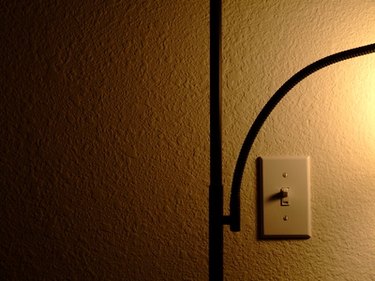Things You'll Need
Philip's head screwdriver
Multimeter
Long-nose pliers
Electrical tape

Switches to appliances function by opening and closing the electrical circuit flowing through the device to provide it with power. For example, light switches allow current to flow through the wires and the bulb, lighting up the bulb. If multiple bulbs fail in the same light socket, check the switch with a multimeter to ensure it still carries a current. Follow these steps to safely test an electrical switch and pay attention to the electrical current flowing through the device.
Step 1
Turn off the switch and turn off the power to the switch at the circuit breaker.
Video of the Day
Step 2
Remove the screws from the faceplate of the switch and remove it from the wall. Set the faceplate aside.
Step 3
Take out the screws holding the switch in the wall box.
Step 4
Remove the wires from the switch with the pliers by gripping the insulated portion. Place tape on the wires and label them so you know which wire to connect to each terminal.
Step 5
Connect the leads to your multimeter. The red lead should connect to the red socket and the black lead to the black socket. These are marked "Voltage" and "COM" respectively.
Step 6
Turn on your multimeter and set its measurement dial to the ohms reading to measure resistance. Touch the probes together to test the meter's function; you should get a reading of less than one ohm.
Step 7
Turn the switch on. Touch the probes to the copper terminals on the side of the switch. According to the University of Washington, you should see a reading of less than 25 ohms. This indicates that electrical continuity exists through the switch. Turn the switch off and test again. You should get a measurement of infinite resistance.
Video of the Day